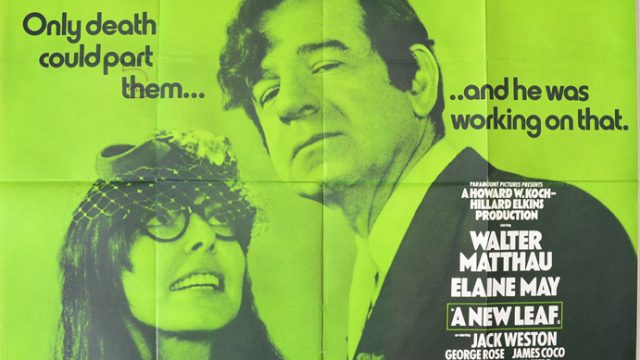Elaine May’s filmmaking career was so marred by studio interference that it’s a little surprising that her distinct voice comes through at all. Paramount notoriously recut Mikey and Nicky, riddling it with continuity errors, and the clashes on Ishtar were so infamous that the film limped into theaters with a huge target on its back. Even her debut feature, A New Leaf, was subjected to a studio cut that removed 80 minutes and eliminated a pair of murders, casting characters and the ending in a different light. Angered by the studio’s actions, May attempted to remove her name from the film and sued to keep it from being released.
While the idea of May’s cut remains tantalizing, the version that exists is still a dark comedy par excellence. It helps that the movie is loaded with visual and verbal wit from beginning to end. Opening on a gag where wealthy heir Henry Graham (Walter Matthau, in one of his best performances) watches two men dressed like doctors work while an EKG machine apparently beeps in the background, May pulls back and reveals that the men were working on Henry’s beloved Ferrari, a wasteful choice of vehicle considering he lives in New York City. Henry soon learns from his accountant, who views him with nothing but contempt, that he has squandered his entire inheritance. Confronted with the likely indignities of being kicked out of his favorite clubs, buying suits off the rack, and driving a Chevy, Henry is driven to near-suicidal despair. His butler (George Rose) encourages him to find a way out of the situation, not due to any sort of friendship, but because he knows he’ll never find anyone else wasteful enough to employ him. “You have managed, in your own lifetime, Mr. Graham, to keep alive traditions that were dead before you were born,” he notes in one of the movie’s best lines. Together, they hatch a plan to borrow money from Henry’s uncle (James Coco) to stay afloat while Henry tries to find someone wealthy to marry.
Enter Henrietta (played by May herself, in a role she was essentially coerced to take), a bumbling heiress with a love of botany. Henry finds her an easy mark, but when her lack of social graces proves to be too much for him, his plan slowly changes to include killing her.
May shares the Coen Brothers’ ability to get the audience to want to follow unsympathetic protagonists, a component of dark comedy that very few directors can master (see: Lucky Numbers, Pain & Gain). Part of how she achieves this is by slowly revealing every character other than Henrietta as criminal at best, and monstrous at worst. Henrietta’s staff and lawyer (Jack Weston), who tries to save her from marrying Henry, are eventually shown to be embezzling from her. Henry’s uncle is introduced laughing, his mouth framing Henry’s face as if he is about to eat him whole, and attempts to sabotage Henry’s wedding for no other reason than to ruin him.
As a first-time director, May showed an incredible sense of visual style and a one-of-a-kind poisonous wit. Even in compromised form, A New Leaf was proof that May was a serious talent. In her sadly truncated career, May established herself as one of the foremost cinematic chroniclers of terrible men. Even today, her influence is still being felt: Dakota Johnson has tapped her to direct the upcoming Crackpot. Time will tell if the project will come to fruition for the nearly 90-year-old May, but her caustic sense of humor is needed now more than ever.

